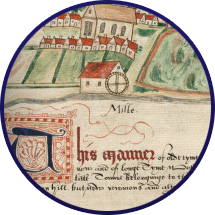Everyday Life in a Northumbrian Manor
All Manor of Things: An introduction to manors and their documents

Summary
We have now covered the basic skills required to start using manorial documents – background, format and handwriting. Hopefully this gives you the confidence to use these records as part of your research. Remember you can go back to any section as often as you want.
However, by now you should be able to:
- Find information in a manorial document – the name of the manor, manor lord/lady, date, type of court and name of the steward.
- Read and translate Roman numerals into our modern numbers.
- Translate dates written in regnal year into modern A.D. dates (or know where to go for this information).
- Understand historic measurements and currencies.
- Recognise the different types of manorial documents and know what they should contain.
- Be able to read the different styles of handwriting – remember, if you find secretary hand difficult to read, start with later italic documents and then work backwards – confidence comes with practice!
Activity - Further Practice
There’s lots more information about these records which will help you in the manorial section on our website. Why not have a go at the questions below to help you to become familiar with its contents.
Hopefully, this has inspired you to use manorial records. Good luck with your research! You never know what you might find.
Berwick-upon-Tweed
- Go to the transcripts page on our website.
- Find the transcripts for Berwick-upon-Tweed manor.
- Open BA/M/2/6, the court roll for 1787.
- Find the answers to the following:
- Who is the lord or lady of the manor?
- Who is the steward?
- Who are the Afferors? See our glossary for a definition.
- What is Alexander Winlaw fined for?
- How much is he fined?
- The Mayors, Bailiffs and Burgesses of Berwick-upon-Tweed
- Edward Willoby, Gentleman
- Alexander Ford and George Anderson
- Loose swine
- Five shillings
Hexham
- Go to the transcripts page on our website.
- Find the transcripts for Hexham manor.
- Find NRO 672/A/3/53, Borough Book, Manor of Hexham, 1735.
- Each page has been uploaded separately, so you will see a different link for page 1, page 2 etc.
- Find the answers to the following:
- On page 3, what must the ‘market keepers’ do?
- On the same page, what must the ‘scalerakers’ do?
- On page 4, what should butchers not do on the pant (fountain)?
- On page 5, what are the total fees for burials in the church?
- Search houses to ensure that any corn which is ready to be sold is brought to market, if not, it should be brought before the bailiff.
- Clean the market place every week.
- Sharpen their knives or bills.
- 13 pence or 1 shilling and 1 pence.


